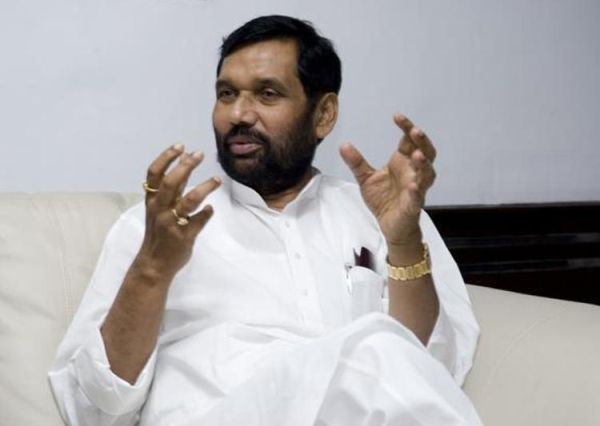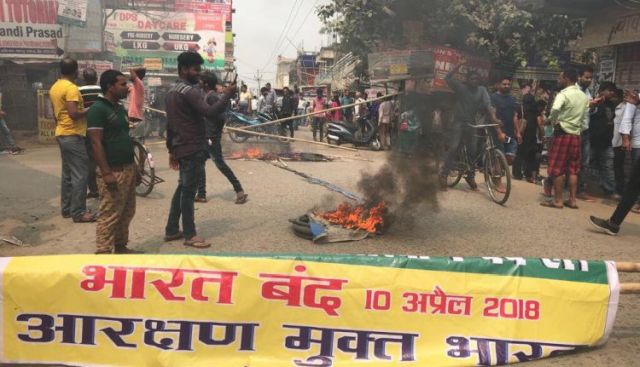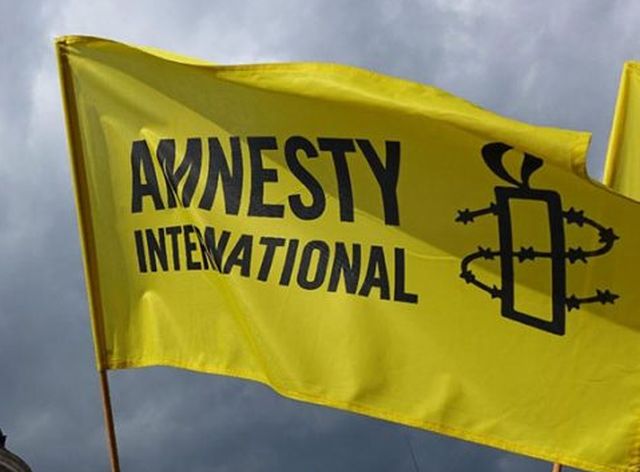
by Editor | May 25, 2021 | Opinions
 By Amulya Ganguli,
By Amulya Ganguli,
It will be a mistake to ascribe the defeats of the Bharatiya Janata Party (BJP) in the Kairana, Noorpur and Bhandara-Gondiya by-elections in Uttar Pradesh and Maharashtra only to the tie-ups among its opponents.
While there is little doubt that in Kairana, an alliance of the Rashtriya Lok Dal (RLD), the Samajwadi Party (SP), the Bahujan Samaj Party (BSP) and the Congress led to the BJP’s defeat, it is also undeniable that the combine wouldn’t have worked if the Muslims, Dalits, backward castes and the Jats hadn’t turned against the BJP.
It is for the BJP to ascertain why they did so when a section of the economists is sanguine about the party’s prospects because of low inflation and high — 7.7 per cent — growth.
But the economy may not boost the party’s fortunes in a context of social fissures. As those associated with the Muslim and Christian communities like former Vice President Hamid Ansari and the Archbishop of Delhi, Anil Couto, have said, both the communities are living with a sense of insecurity. The reason apparently is the fear of suddenly being attacked and even killed by saffron groups on one pretext or another.
The unhappiness of the Dalits, too, has been obvious in the wake of several instances of lynching and the continuing tension in Uttar Pradesh’s Saharanpur area between the upper caste Rajputs and the Dalits, one of whose leaders, Chandrashekar Azad “Ravan”, has been in indefinite detention.
It is obvious that with sizable sections of the Muslims, who constitute 14.2 per cent of the population, Dalits (16.6 per cent) and Christians (2.3 per cent) alienated from the BJP, its chances of electoral success cannot be very high. The party did beat the odds against it in this respect in 2014, but that was because of the expectations of rapid, employment-oriented development raised by Narendra Modi.
Arguably, these hopes may still be fulfilled if the present growth rate continues. But jobs cannot provide any solace to people who feel that they are second class citizens in today’s India, as a retired police officer, Julio Ribeiro, has said.
The angst of the minorities has combined with the realisation among the BJP’s opponents that the only way to defeat it is via electoral tie-ups among themselves. This is what happened in Kairana, where a combined opposition seamlessly garnered the votes of the Muslims, the Dalits, the backward castes and the Jats.
It was the same in Noorpur, where the SP candidate received the support of the other opposition parties, and in Bhandara-Gondiya, where the Nationalist Congress Party (NCP) and the Congress successfully put up a untied fight against the BJP.
The formula, therefore, for success against the BJP is clear — unite or perish. As West Bengal Chief Minister Mamata Banerjee once said, the objective should be to offer the BJP a one-to-one fight by parties which are the most influential in a certain region.
If this is done, victory is assured as the Rashtriya Janata Dal’s three successive victories in Araria, Jehanabad and Jokihat in Bihar against the ruling Janata Dal-United have shown.
If the BJP managed to win in Palghar in Maharashtra against the Shiv Sena, it was because the latter’s over-confidence made it go it alone. Yet, the Sena’s leader, Uddhav Thackeray, recently spoke of the need for an opposition alliance against the BJP.
There is little doubt that the recent by-election victories, along with the formation of the Janata Dal (Secular)-Congress government in Karnataka, are being seen as precursors to a combined opposition at the national level.
If such a unity is achieved, it presages troubled times for the BJP because there is no way it can withstand such a concerted offensive. In a way, the united opposition will be a replica of the 24-member coalition government under Atal Behari Vajpayee which began to fall apart in the aftermath of the 2002 Gujarat riots.
In the present instance, the threat to an anti-BJP alliance is posed by the ambitions of several of its players — Rahul Gandhi, Mamata Banerjee, Mayawati, Sharad Pawar — to be the Prime Minister.
The BJP may be banking on such dissonance to stave off any challenge. But the party will nevertheless be aware that the ease with which it ascended to power in 2014 will be absent during the next general election for two reasons.
One is the sign that Modi’s appeal is not as overwhelming as it once was, if only because the anticipated revving up of the economy is taking time. And the other is the sameness of his criticism of the Congress — corruption, dynasty, et al. The party paid a heavy price for these sins in 2014 and lambasting it over and over again on the same issues runs the risk of what is known in legal terminology as double jeopardy where a person cannot be convicted of the same offence twice.
The political scene is poised, therefore, between the possibility of Modi not being as effective a campaigner as before and the opposition trying to counter him while battling its own fissiparous tendencies.
(Amulya Ganguli is a political analyst. The views expressed are personal. He can be reached at amulyaganguli@gmail.com)
—IANS

by Editor | May 25, 2021 | Interviews, News, Politics
 By V.S. Chandrasekar and Brajendranath Singh,
By V.S. Chandrasekar and Brajendranath Singh,
New Delhi : The government will issue an ordinance to uphold the rights of Scheduled Castes and Scheduled Tribes if the Supreme Court does not go back on its judgment deleting the provision of immediate arrest on complaints from Dalits, says Food Minister Ram Vilas Paswan, who asserts that the Constitution too will be amended if need be.
He acknowledged that the government had a problem of perception on the Dalit issue but felt this can be set right in no time if sufficient steps were taken.
“This anti-Dalit perception of the government can be changed in mere two days. The matter will be heard on May 3 in the court. I have said that if the court’s verdict will not be in favour (of those who demand retention of the original provisions), we (government) will go for an ordinance and that too without a change of comma and full stop in the original SC and ST (Prevention of Atrocities) Act,” Paswan told IANS in an interview.
Asked whether the government will seek to nullify the court verdict if it does not change its order, he said: “Yes. We will not allow the dilution of the Act at any cost. Even a comma and full-stop will be retained as in the Act. The Act will continue in its original form. We will do whatever needed to protect the rights of SCs and STs. If need be, we will go for constitutional amendment too.”
Paswan, the Dalit face of the NDA government, has been leading a campaign in pushing the government to file a review petition in the Supreme Court against the March 20 two-bench order that a government official or a civilian cannot be immediately arrested if a FIR is filed by a person belonging to SCs and STs.
The Supreme Court had said that arrest under the Act was not mandatory and recourse to coercive action would be taken only after preliminary inquiry and sanction by the competent authority. The court said the arrest should be cleared by an official of the Superintendent of Police after a complaint is filed.
The government filed a review petition earlier this month seeking an immediate stay of the judgment but the court refused to grant any relief saying the ruling had been misunderstand.
Paswan, a key member of the Group of Ministers on the issue headed by Home Minister Rajnath Singh, said the government would adopt a similar approach on reservation in promotions in government and public sector organisations.
“We are going to do the same for reservation in promotion. In this case, the Supreme Court has not said that reservation in promotion is unconstitutional but has put three conditions of backwardness, efficiency and representation.
“All the three conditions do not apply. No one can charge any SC/ST Class I officer that he is not efficient. I have asked the AG to go to court and put forward these points. Even if the court does not agree, we will not hesitate to bring an ordinance. If need be, we will bring amendments in the constitution.”
Paswan had campaigned strongly for reservations for Other Backward Classes in the late 80s as part of the V.P. Singh government. “When I speak, the message goes that I am speaking as I am a Dalit.”
He said the government had done a lot for the SC and ST communities but the perception that should have been there in public mind was not there.
“V.P. Singh was from a royal family and an upper caste leader. But after nine months as Prime Minister the perception about him changed. There were slogans in his favour like ‘Raja Nahi Fakir Hai, Desh Ki Taqdeer Hai’. He became a leader of Dalits, poor and backward classes.
“This government is working a lot but is not able to propagate its work properly among the SC/ST communities. During the Una incident in Gujarat in 2016 (in which Dalits associated with disposing of dead cattle were lynched, the state government took action. They replaced the Chief Minister. Around 36 officials were transferred but they didn’t put these things before the public properly. If Indira Gandhi would have been there, she would had spoken loudly about it. I did this and I did that for Dalits.
“Modiji belongs to the weaker section of the society. He is from Most Backward Caste (MBC). He is also from a very poor family, economically and socially. But the kind of perception should have been there for him is not there. Just because he has a tag of being from RSS and the BJP. As a result, the perception about him is not changing. All his good work gets washed away when someone says something unwanted and unwarranted.”
Paswan said it was Mayawati who as as Chief Minister of Uttar Pradesh issued an order in October 2007 against the misuse of the SC and ST (Prevention of Atrocities) Act and said that police should register a case only after probing a complaint.
“It was she who weakened the Act and despite that she calls herself a Dalit leader.”
Asked why the government reacted late in filing the review petition, Paswan said: “Every department has its own style of functioning. If I get a work, I call the officials concerned and take decisions without delay… The court’s verdict came on March 20 and the review petition was filed in April due to weekend holidays and other reasons.”
He said the Law Minister should have discussed the issue in a day or two with the Attorney General. “I met the Prime Minister with other MPs over the issue. A GoM also met under Rajnath Singh where I put up my concerns.”
He said the Prime Minister told everyone clearly to file a review petition.
Paswan said the Supreme Court had “broken the teeth” of the Act. The court said the accused can get anticipatory bail before his arrest.
(V.S. Chandrasekar can be contacted at chandru.v@ians.in while Brajendranath Singh can be reached at brajendra.n@ians.in)
—IANS

by Editor | May 25, 2021 | News, Politics
 Patna : Over a dozen of people were injured on Tuesday in a violent clash in Bihar during the “Bharat Bandh” called by various groups to protest against reservation policies, police said.
Patna : Over a dozen of people were injured on Tuesday in a violent clash in Bihar during the “Bharat Bandh” called by various groups to protest against reservation policies, police said.
Supporters, mostly upper castes youths, blocked roads and forcibly enforced the nationwide shutdown in Ara town, Bhojpur district.
“More than a dozen people were injured in the violent clash between supporters of the Bharat Bandh and a pro-reservation group comprising OBCs and Dalits,” a district police official said.
Additional security have been deployed in Ara.
According to reports reaching here, hundreds of youths opposing reservation to SC/ST and OBCs and supporting Bharat Bandh, have blocked roads at several places, halted trains and forcibly closed markets in Patna, Begusarai, Lakhisarai, Muzafffarpur, Bhojpur, Sheikhpura and Darbhanga districts.
The clash comes a day after the Union Home Ministry issued an advisory to all states to take precautionary measures in view of calls on social media for the “Bharat Bandh” by various anti-reservation groups to protest clashes during the April 2 SC/ST shutdown.
The Bharat Bandh on April 2 by Dalit groups against the alleged dilution of the Scheduled Castes and Scheduled Tribes (Prevention of Atrocities) Act by a Supreme Court order had led to violence and arson in many parts of the country which claimed several lives and left hundreds of civilians and policemen injured.
—IANS

by Editor | May 25, 2021 | News, Politics
 New Delhi : The Supreme Court on Tuesday declined to stay its ruling which activists say has diluted a law aimed at preventing atrocities on Dalits and tribes.
New Delhi : The Supreme Court on Tuesday declined to stay its ruling which activists say has diluted a law aimed at preventing atrocities on Dalits and tribes.
A bench of Justice Adarsh Kumar Goel and Justice Uday Umesh Lalit, however, said compensation can be paid to victims under The Scheduled Castes and Scheduled Tribes (Prevention of Atrocities) Act, 1989, even without a FIR being registered.
The bench said this on a plea by the Centre seeking recall of its March 20 order where the apex court had said that no arrest would be affected on a complaint under the Act without an inquiry.
—IANS

by Editor | May 25, 2021 | News, Politics
 New Delhi : Human rights NGO Amnesty International India on Thursday launched an interactive data website for keeping a track of and documenting hate crimes across the country.
New Delhi : Human rights NGO Amnesty International India on Thursday launched an interactive data website for keeping a track of and documenting hate crimes across the country.
“The first step to ensuring justice and ending impunity for hate crimes — where people are targeted because of their membership of a particular group — is to highlight their occurrence,” said Aakar Patel, Executive Director, Amnesty International India.
In 2017, an alarming number of alleged hate crimes — including assault, rape and murder — were reported against people from marginalized groups, especially Dalits and Muslims, the Amnesty International said as it launched the website named ‘Halt the Hate’.
“Our website aims to draw attention to some of these crimes by tracking and documenting them. Dalits have been attacked for merely sporting moustaches, and Muslims lynched for transporting cattle. Dalit women have been branded as witches, and raped and killed,” Patel said.
‘Halt the Hate’ documents alleged hate crimes against Dalits, Adivasis, members of racial or religious minority groups, transgender persons, and other marginalised people which are reported in mainstream English and Hindi media.
It documents 141 incidents of alleged hate crimes against Dalits and 44 against Muslims in 2017, including 69 incidents of killings where at least 146 people were killed. 35 incidents were found where women from these groups or transgender persons faced sexual violence.
The website documents alleged hate crimes from September 2015, when Mohammad Akhlaq was killed in Dadri, Uttar Pradesh, for allegedly possessing beef.
Cow-related violence and so-called ‘honour killings’ were among the common instances of the hate crimes.
Uttar Pradesh was the state with the most such incidents in 2016 and 2017. In 2016, 237 alleged hate crimes were recorded. Uttar Pradesh, Haryana, Tamil Nadu, Karnataka and Gujarat recorded the most incidents.
Patel said that the extent of hate crime in India is unknown because the law – barring some exceptions – does not recognize hate crimes as specific offences.
“The data on our website is just a snapshot of alleged hate crimes in India. Many incidents are not reported in the media. While criminal investigations have been initiated in some cases, too many have gone unpunished,” he said.
He said police needed to take steps to “unmask any potentially discriminatory motive” in a crime, and political leaders must be “more vocal” in denouncing such violence.
—IANS






